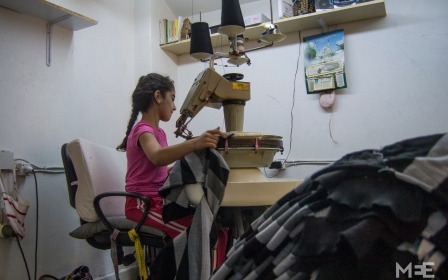HRW: Palestinian children being exploited on Israeli settlements

Palestinian children are suffering illness and injury as a result of being exposed to dangerous pesticides and using unsafe equipment, while working underage on Israeli settlement farms, according to a Human Rights Watch report.
Hundreds of Palestinian children as young as 11 work in Israeli settlements, mostly in the Jordan Valley, where they can earn up to $19 per day, the report states. However, they are exposed to hazardous conditions as a result of pesticides, dangerous equipment and extreme heat.
International, Israeli, and Palestinian law all set the minimum age of employment as 15 years old. However, HRW said that the majority of the children they interviewed told them that they began working at the age of 13 or 14, with one saying he worked with a boy who was 10 years old.
“Some children who work on settlement farms described vomiting, dizziness and skin rashes after spraying pesticides with little protection, and experienced body pain or numbness from carrying heavy pesticide containers on their back,” the report said. “Many suffered cuts from using sharp blades to cut onions, sweet peppers and other crops. Heavy machinery also causes injuries. One child said he saw another child who was pinned under a tractor that rolled over [him].”
Furthermore, most of the children drop out of school to work in the agricultural sector in order to provide for their families, who are suffering heavy financial burdens due to Israeli policies that prevent them from accessing their land, water and ability to transport goods.
“Children from communities impoverished by Israel’s discrimination and settlement policies are dropping out of school and taking on dangerous work because they feel they have no alternatives, while Israel turns a blind eye,” said Sarah Leah Whitson, the director of HRW’s Middle East and North Africa division.
“Israel’s settlements are profiting from rights abuses against Palestinian children,” she continued.
Under international law, the West Bank and East Jerusalem are deemed as occupied Palestinian territories and any construction of Jewish settlements on the land is considered to be illegal.
Of the 38 children HRW interviewed, all said that they were recruited through unwritten agreements with Palestinian middlemen who work on behalf of the Israeli settlers. The lack of official documentation in terms of a work contract makes it almost impossible for Palestinian workers in settlements to demand their rights under Israeli labour law.
This is a primary reason why Israeli employers use these middlemen in the first place. Many of the children have no knowledge of the minimum wage law nor of the fact that Israeli labour laws apply to Palestinians working in the settlements. The children interviewed said they had never talked to an Israeli labour inspector before.
“None of the children interviewed received medical insurance or social insurance benefits, and the majority of those who needed medical treatment due to work injuries or illness said they had to pay their own medical bills and transportation costs to Palestinian hospitals,” said the report. “Three Palestinian children who got sick or were injured while working and had to go home or to the hospital said they were not even paid for the hours they had worked that day, much less for the time they had to take off work.”
According to the report, the children and adults interviewed all hoped that with international pressure, Israel would stop agriculture settlements and allow Palestinians to access their lands, water and economic market. The adults said they wished they could work on their land in order to support their children to stay in school and graduate.
Stay informed with MEE's newsletters
Sign up to get the latest alerts, insights and analysis, starting with Turkey Unpacked
Middle East Eye delivers independent and unrivalled coverage and analysis of the Middle East, North Africa and beyond. To learn more about republishing this content and the associated fees, please fill out this form. More about MEE can be found here.




